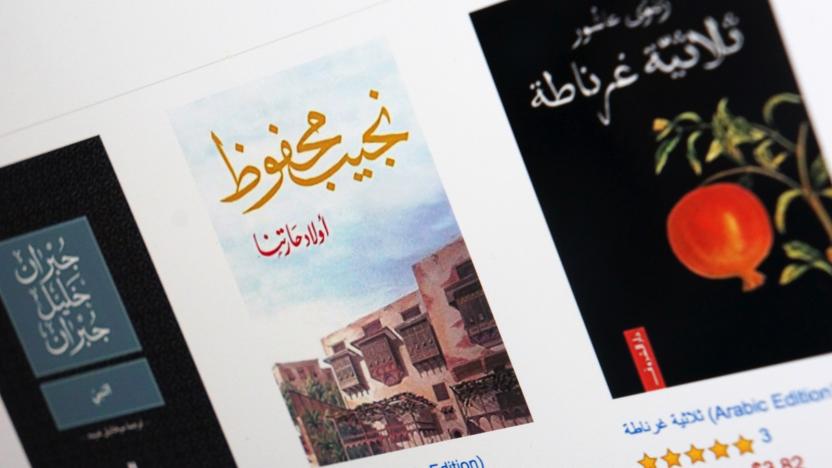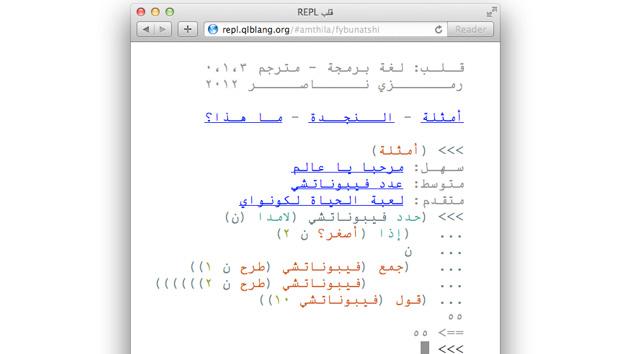arabic
Latest

Now Duolingo teaches the world's five most common languages
Duolingo's expanding language repertoire might just help you with a trip to the Middle East. The service now offers a course that teaches Arabic to English speakers -- specifically, a conversational version of the relatively universal Modern Standard Arabic. The program gradually introduces the alphabet, grammar differences and phonetics of the language to ensure that you're comfortable with the relatively difficult-to-learn linguistic structure.

Amazon Kindle finally supports Arabic language books
Arabic language authors don't get many opportunities in the e-book world, whether it's due to a basic lack of support for the language (which reads right-to-left, is written in cursive and includes pronunciation marks) or the complexities of distributing the books in the first place. Amazon may be making it easier, though -- it's launching support for Arabic language books on Kindle devices and apps, including a dedicated section on the Kindle Store. The texts support all the same font adjustment, search and highlighting features you'd expect in other languages, while over 12,000 books are available worldwide.

Google launches digital skills training for Arabic speakers
As part of Google's focus on supporting digital literacy and STEM advocacy, the company has launched Maharat min Google ("Building Capabilities with Google"). This program is aimed at helping women and young people in the Arabic-speaking world "get ready for future job opportunities, advance their careers, or grow their businesses." The examples Google cites are training for social media, video, online marketing and e-commerce.

Instagram now supports three right-to-left languages
You can post and comment in more than 24 different languages via Instagram already, but they've all been left-to-right languages like English. Instagram just announced that it has added Arabic, Hebrew and Farsi languages -- all of which read right to left. The three languages will be available on the Android version of Instagram first.

Skype's live translator feature now supports Arabic
Skype is probably best-known as a video chat client, but Microsoft wants it to be all things chat to all people -- even if they aren't speaking the same language. Back in 2014, the app gained the ability to take your speech and translate it into selected other languages so people who didn't speak the same language could still communicate. Today, Skype is officially rolling out support for its eighth spoken language: Arabic.

Artist helps Arabic speakers to code without learning English
If you want to build software, it's almost mandatory that you'll need to know the English language since all of the tools rely upon that tongue. Unfortunately, that puts non-English speakers at a huge disadvantage when it comes to computer literacy and programming. Artist and coder Ramsey Nasser decided to remedy the problem by constructing a programming language written not in English, but in Arabic. Nasser had more than a few problems getting "Alb" to work, since Latin-based text editors couldn't handle the script, and even GitHub struggled to accommodate the data. In the end, Nasser had to use Lisp, a language from 1958, because it doesn't rely upon non-Arabic punctuation like semicolons and commas. "Alb" actually works, and if you fancy giving it a go, then you can test your Arabic programming skills down at the source.

iOS 7 is making life more difficult for blind Arabic speakers
When it comes to accessibility options, Apple's iPhone has traditionally done a rather good job of being as all-inclusive as possible. For blind Arab iPhone owners, iOS 7 changed that, and now they are begging Apple to change it back. For the visually impaired, the iPhone's (and iPad's) VoiceOver feature is a godsend. Using gesture controls, blind users can navigate their devices the same as anyone else, relying on a built-in voice to tell them exactly what they are doing. It's a system that has worked well for many iOS generations now, but with the upgrade to iOS 7, something happened to the familiar "Majed" voice that Arabic speakers were used to: it disappeared. In its place is "Tariq," a different -- and by many accounts, inferior -- voice that appears to be not only a lower quality, but also quite buggy. The new Arabic VoiceOver option frequently adds random syllables to words, making it difficult to comprehend, and also has a nasty habit of leaving spaces out between words. Mohammed AlWahhabi (his blog, in Arabic, here), an Arab iPhone user that originally pointed out this glaring problem to me noted that, at times, the voice assistant will speak an entire sentence as though it were one long word, with no pauses whatsoever. Then there's the issue of the "Enhanced Quality" option that iOS offers for the various languages VoiceOver covers. The vast majority of the high-quality language options take up more than 250 MB (all the way up to 340 MB for German) of on-device storage, producing extremely clear dialogue. Toggling this option for Arabic takes up less than 60 MB. After listening to a handful of sentences, it is apparent that the voice, even in its highest quality, isn't close to ideal. No amount of tweaking to the VoiceOver speed or quality options seems to help much, and users desperate for their iPhones to return to normal have even taken to YouTube to voice their displeasure with Tariq. "We hope that you find suitable solution either by improving the current voice [Tariq] or by retrieving the former voice [Majed]," reads part of a lengthy plea on the video site, listing names and offering testimonials on how broken the new VoiceOver option seems to be. AlWahhabi told me that after contacting Apple multiple times for a solution, he was told that if enough individuals take issue with the change, it may be addressed. I am neither blind, nor do I speak Arabic, but this seems to be an issue that deserves to be corrected sooner rather than later, as I can't imagine how frustrating it would be to have a device become practically unusable thanks to a software update.

Bug in CoreText allows a string of characters to crash apps
A serious bug has been uncovered in Apple's CoreText layout engine, which is responsible for laying out text in applications that make use of the Cocoa framework on OS X and iOS systems. The bug causes any app relying on CoreText to crash when a specific string of Arabic characters is displayed, meaning just the simple act of viewing a tweet or receiving an instant message is enough to trigger the crash. With apps like messaging or email clients, the problem is more severe, as the app may continue to crash repeatedly if it attempts to display previous message history or previews of email content. The good news is it appears that Apple has already addressed this bug in the upcoming versions of OS X 10.9 Mavericks and iOS 7, but as of yet, no updates have been released to correct the issue on the current versions of the operating systems that are affected (OS X 10.8 and iOS 6). This isn't the first time that innocent strings have been found to cause crashes in apps. Back in February, an odd bug was discovered which caused apps to crash whenever a reference to a local file URL (e.g., file:///) contained a capital "F." While there isn't a foolproof way to prevent exploits like this from being used, some sites have taken preventative measures. Facebook is currently blocking messages which are found to contain the string, and I'm sure as word of the issue gets around, Twitter and other sites may take similar actions. The best advice I can give for users, however, is to be cautious about viewing links and reading messages from people that you don't know or that seem otherwise suspicious. Obviously, the nature of this bug makes it difficult to completely avoid, as receiving a message or opening a page where a spammer has left the string in a comment could easily trigger a crash, and there's little that could be done to prevent it. Here's hoping that Apple picks up on this and corrects the issue before anyone finds any creative methods for taking advantage of the problem. [via TechCrunch]

YouView adds World TV Boosts for Afrikaans, Arabic and Japanese
YouView's catch-up programming has remained mostly UK-centric so far, but TalkTalk is adding some diversity with a trio of World TV Boosts. The new Arabic TV, JSTV and kykNET TV packs give viewers a combined 16 channels of Afrikaans, Arabic and Japanese content. While the Boosts aren't cheap at a minimum £10 ($15) per month, they could be vital for ex-pats who want to keep up with news and shows from their home countries.

Clippy hits the road as Office 365 expands to 38 new countries
Almost five months after its debut, Office 365 is getting 38 new passport stamps. Clippy's hitting such exotic locales as Fiji, the Bahamas and Barbados, and it's even picking up new languages along the way. The subscription-based productivity suite now includes support for Vietnamese, Arabic and Malay. What's more, Redmond is happily accepting five new currencies for payment, too. Brazil, Hong Kong, Mexico, Malaysia and India can all use their native money to pay for the software as a service. Sadly, there's still no word from Microsoft about accepting Bitcoins.

Twitter brings support for right-to-left languages: volunteers by done localization
Twitter's now available in Arabic, Farsi, Hebrew and Urdu, with the task of translating the likes of the retweet button, list classifications and the fail whale largely done by a task force of volunteers. The languages were added to Twitter's translation to-do list back in January, with around 13,000 helpers getting the job done since then. You can change your settings to one of the newly supported languages in the drop-down account menu, while Twitter continues to plug more linguistic holes at its translation center -- interested polyglots can consult the second source below.

First non-Latin domain name goes live, trips out browsers
ICANN decided late last year that URLs would finally be allowed with non-Latin characters, but it wasn't until this week that the first one was set free onto the world wide web. The new hot place to visit is http://موقع.وزارة-الأتصالات.مصر/, and while you'll need to know a bit of Arabic to actually pronounce it, you don't have to have any foreign language skills to click the link and see what happens. As of now, the site loads as http://xn--4gbrim.xn----rmckbbajlc6dj7bxne2c.xn--wgbh1c/ in pretty much every browser we've tried here in the US, but all of the site content seems to populate just fine. Remember that URL gold rush from last century? Round two is officially on.

Silkroad Online celebrates their new Arabic language service with two worldwide events
It's certainly not everyday we hear that a game has been launched in the Arabic language here at Massively, but we guess that today is one of those days! The free to play title Silkroad Online has gone the distance and has translated their game into Arabic. To help celebrate the new translation, the entire international Silkroad community is getting two events with real world prizes. The first event, which is less of an event and more of a raffle, gives you between two and ten contest tickets each time you purchase cash for their item shop. If your contest ticket is pulled, you could win prizes including an 8 gig iPod Nano or a brand new laptop. The second event, which is more of an event, is to level a character from one to 40 before March 2nd. If you successfully make it, you'll get entered into a separate raffle. Prizes here include 10,000 skill points for a character to spend on increasing your skills, Seal of Moon grade weaponry for your characters, or a brand new PSP. For all of the information on these two events, check out the Silkroad main page.

ICANN set to allow non-Latin characters in domain names, half the world rejoices
In the name of cultural and linguistic diversity, our loyal comrades over at the ICANN are about to approve availability of domain names in non-Latin alphabets. That's right, Chinese and Japanese folks will finally be able to address their websites in their native tongue, as will fans of Arabic, Cyrillic, Greek or Hindi scripts. Basically, linguists of every type are finally invited to the interwebs party, a move described by ICANN chairman Peter Thrush as "the biggest change technically to the internet since it was invented." This follows an extensive two-year testing period for a translation engine that can convert your lazy Latin scribblings into the refined hieroglyphics of modern Cantonese. Pending approval this Friday, the first new domain names will start coming out in 2010, when we can expect a whole new wave of internet land grabbing. [Via Switched]

Arabic Rappelz to hold International Day Against Drug Abuse and Illicit Trafficking event
Every year on the 26th of June, the world recognizes the International Day Against Drug Abuse and Illicit Trafficking, a campaign begun by the United Nations and first held in 1988. The publishers of the Arabic version of Rappelz, Game Power 7, have issued a press release signifying their involvement in this year's campaign; there will be a one-week "education and awareness" event held in-game that mirrors the UN's sentiments for the day itself.As displayed in the picture above, the international campaign slogans "Do drugs control your life?" and "Your life. Your community. No place for drugs" will be featured in Rappelz for the event. Virtual gifts will also be given away, presumably educational in some form. Game Power 7 stated that using their virtual world to promote good values in the community is part of the company's strategy, so future events of this kind might find their way into the game. To find out more about the International Day Against Drug Abuse and Illicit Trafficking, the best place to start is the UN's official page, which also features links to some nation-specific pages.

iPod being used by Army as Arabic translator in Iraq
Macenstein's got the tip on the Army using iPods in Iraq to speak Arabic. Vcommunicator Mobile is a hardware/software setup (the iPod straps to your arm, and gets a small speaker hooked up to it) that allows soldiers in Iraq to "speak" Arabic by choosing and playing certain phrases through an iPod-like interface. Very interesting-- the Arabic text even shows up on the screen as the sound clip is being played, and phonetic translations and simulated graphics of suggested gestures for each phrase are included in the browser.A new Nano version is planned (having the whole thing in a Flash drive will probably make it a little more sturdy), but for now Mac says the 10th Mountain Division will be hauling around 160 iPods to speak phrases like "Please get out of the car," and "may I see your ID?"Here's hoping the whole thing is working as well as Vcom3D is saying that it does-- clear communication is invaluable, especially in an environment as volatile as Iraq. Just another great use for Apple's little mp3 player.








